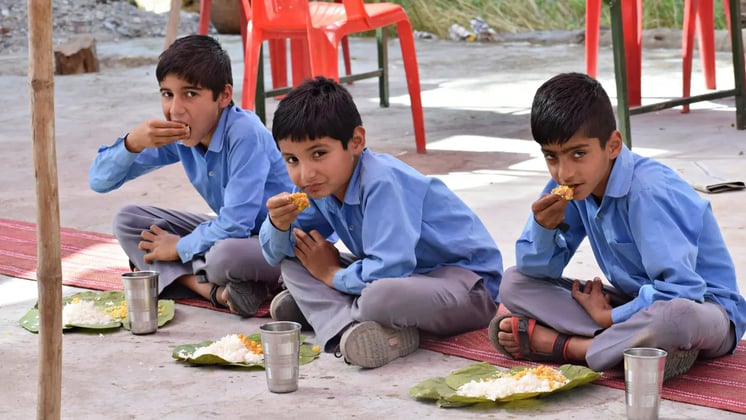- Protein for Growth and Repair
- Carbohydrates for Energy
- Vitamins and Minerals for Immunity and Focus
- Healthy Fats for Brain Development
- Fiber and Hydration for Digestion
Introduction

The early years of childhood and adolescence are a time of rapid growth, active play and endless curiosity. To keep up with all that, kids need the right mix of nutrients in the right amounts. That’s where the concept of a balanced diet comes in. It’s about making everyday meals complete, colourful and nourishing.
A balanced diet means kids get enough protein for strong muscles, calcium for healthy bones, iron for steady energy, and vitamins for sharper memory and stronger immunity. Foods rich in good fats and fibre help with digestion and provide lasting energy for busy school days and playtime. Even small changes, such as adding seasonal fruits, green vegetables, or whole grains, can make a big difference in how kids grow and feel each day.
The benefits go beyond physical health. Nutritious meals help kids focus better in class, stay alert during homework and develop resilience against common illnesses. They also learn to enjoy healthier foods naturally when variety and taste is built into their plates.
A balanced diet matters because it gives kids the building blocks they need for steady growth today and good health tomorrow. By making thoughtful food choices early, parents set the foundation for their child’s overall development at every stage.
5 Key Elements That Make a Child’s Diet Truly Balanced

Food is the fuel that powers their bodies and minds. During the years of rapid growth, their nutritional needs are higher, and the right balance of foods becomes essential. A balanced diet is not about serving expensive or unusual ingredients; it is about including the right portions of proteins, carbohydrates, fats, vitamins, and minerals in meals that children already enjoy.
Protein for Growth and Repair
According to a study published in Nutrients. 2025 protein is vital for growing children because it supports the development of muscles, repairs tissues, and even plays a role in producing enzymes and hormones. Sources like lentils, eggs, paneer, chicken, and fish provide high-quality protein. For vegetarian diets, dals, beans, and soy are excellent choices. Including protein in each meal helps children grow steadily and stay active.
Carbohydrates for Energy
Children are naturally active, and their bodies need consistent energy to match their busy routines. As per a study published in J Cereal Sci. 2014 whole grains such as wheat, oats, and brown rice give complex carbohydrates that release energy slowly, keeping them energized for school and play. Unlike sugary snacks that cause energy crashes, these foods support concentration and stamina.
Vitamins and Minerals for Immunity and Focus
Vitamins and minerals are essential for everything from sharper vision and stronger bones to better immunity and improved focus. According to the National Institutes of Health, vitamin A supports eyesight, Vitamin C strengthens immunity, and iron prevents tiredness. Calcium and Vitamin D are crucial for bone development. Including leafy vegetables, fruits, dairy, and nuts ensures kids get these nutrients regularly.
Healthy Fats for Brain Development
Fats often get a bad name, but healthy fats are necessary for kids. Research conducted by Matern Child Nutr. 2011 shows that they support brain development, hormone balance, and the absorption of vitamins. Foods like nuts, seeds, avocados, and ghee provide healthy fats that benefit memory and overall growth. Avoiding excess fried or packaged foods while focusing on these natural sources makes a big difference.
Fiber and Hydration for Digestion
A study published in Nutrients. 2022 highlights that fiber ensures smooth digestion and keeps children feeling full for longer, preventing overeating of junk food. Whole fruits, vegetables, pulses, and whole grains are natural fiber sources. Along with fiber, hydration is equally important. Drinking enough water and including hydrating foods like cucumbers and oranges keep digestion on track and support healthy skin.
Conclusion

A balanced diet is about giving children the right mix of nutrients through everyday foods. By focusing on protein, energy-giving carbohydrates, immunity-boosting vitamins, brain-supporting fats, and digestive health through fiber, you provide a strong foundation for growth. Small, consistent choices in daily meals add up to big results over time. With the right nutrition, kids grow stronger, think sharper, and develop the resilience they need for a healthier future.
Her love for storytelling began with reading her grandfather’s speeches, where Tarishi saw the power of words in creating lasting memories. Combining her passions for food and writing, she has turned her life into a fulfilling path of sharing stories that celebrate flavours and how food brings communities together.
The views expressed are that of the expert alone.
The information provided in this content is for informational purposes only and should not be considered a substitute for professional medical advice, diagnosis, or treatment. Always seek the advice of your physician or another qualified healthcare provider before making any significant changes to your diet, exercise, or medication routines. This is a sponsored article.
References
https://pmc.ncbi.nlm.nih.gov/articles/PMC9268622/
https://pmc.ncbi.nlm.nih.gov/articles/PMC6860654/
https://ods.od.nih.gov/factsheets/VitaminA-Consumer/
















